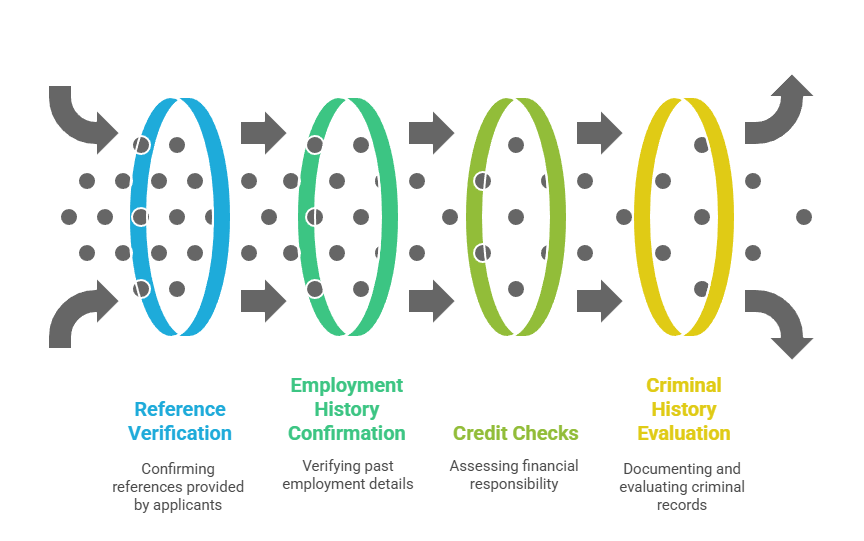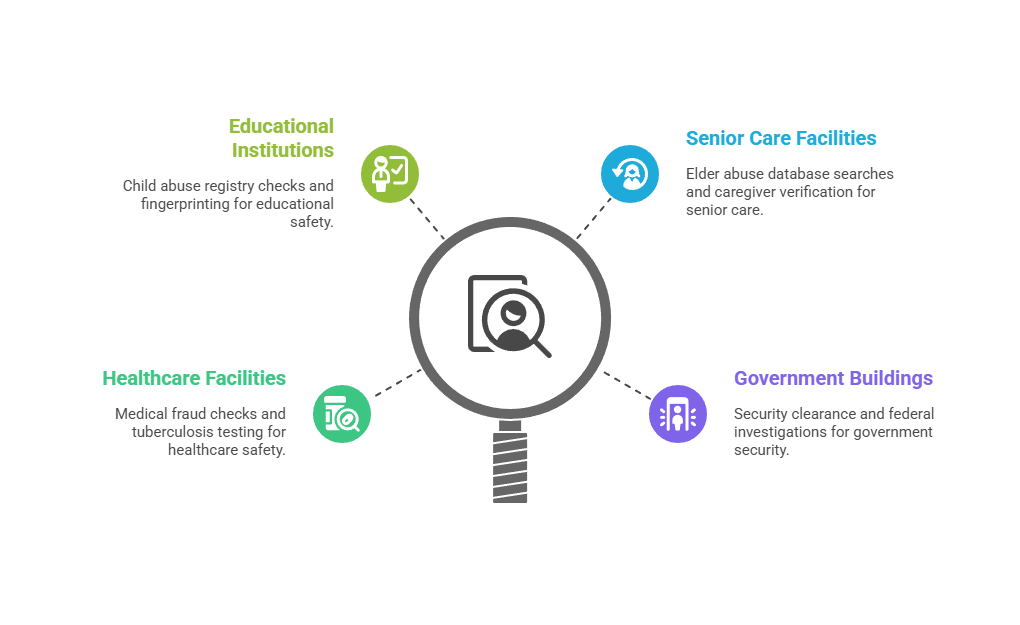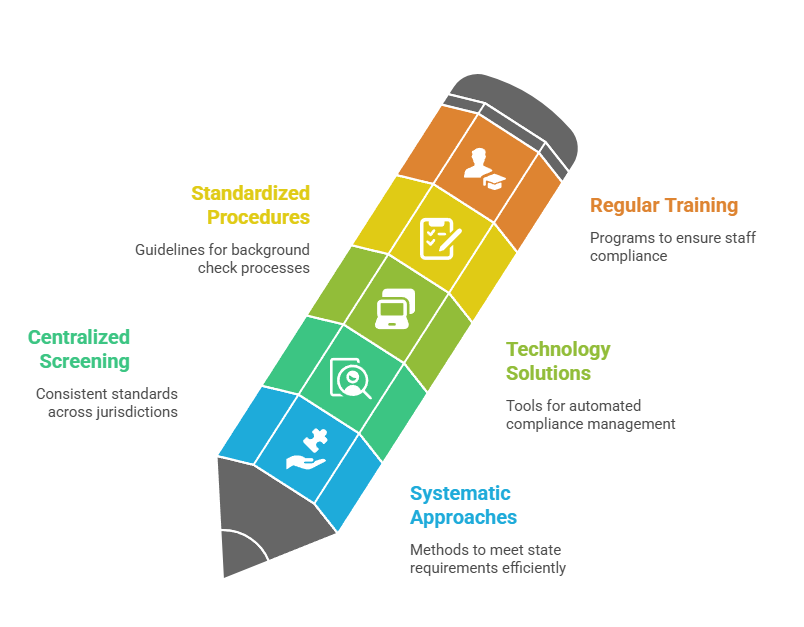Cleaning service background check laws vary significantly across states, with some requiring comprehensive criminal history checks while others have minimal regulations. Understanding state-specific requirements is essential for cleaning businesses to maintain compliance and protect their operations from legal liability.
Key Takeaways
- Background check requirements for cleaning services differ dramatically by state, ranging from mandatory criminal history checks to voluntary screening policies.
- Licensing requirements vary significantly, with some states requiring business licenses, individual certifications, or both for residential cleaning operations.
- Non-compliance penalties can include fines up to $10,000, license revocation, and potential criminal charges depending on state regulations.
- Federal Fair Credit Reporting Act (FCRA) guidelines apply universally, requiring proper disclosure and consent procedures regardless of state laws.
- Insurance requirements often correlate with background check mandates, as carriers may require employee screening for coverage approval.
- Regular compliance audits are recommended quarterly to ensure ongoing adherence to evolving state regulations and local ordinances.
Understanding Federal vs. State Background Check Requirements
Federal regulations establish the baseline framework for cleaning service background check laws through the Fair Credit Reporting Act (FCRA). The FCRA mandates that employers obtain written consent before conducting background checks and provide adverse action notices if employment decisions are based on background check results. However, individual states maintain the authority to implement more stringent requirements beyond federal minimums.
State requirements house cleaners must follow often exceed federal minimums, particularly in states with heightened security concerns or consumer protection laws. These additional requirements typically address specific criminal history lookback periods, disqualifying offenses, and mandatory reporting procedures. Furthermore, states may impose unique licensing requirements that combine with background check mandates to create comprehensive regulatory frameworks.
The intersection of federal and state laws creates a complex compliance landscape that requires careful navigation. Cleaning businesses must implement policies that satisfy the most restrictive requirements applicable to their operations while maintaining consistent standards across all locations. Additionally, businesses operating across multiple jurisdictions must understand how varying state laws interact with federal requirements to avoid compliance gaps.
States Requiring Mandatory Background Checks
Comprehensive Criminal History States
California, New York, and Florida lead the nation in comprehensive cleaning service background check laws that require extensive criminal history screening. California's regulations mandate seven-year criminal history checks for all cleaning personnel entering private residences, with automatic disqualification for violent felonies and theft-related convictions. New York requires fingerprint-based background checks through the state's Division of Criminal Justice Services, while Florida mandates both state and federal criminal history searches for residential cleaning compliance.
These states also require regular background check updates, typically every two to three years, to maintain compliance with ongoing operations. The comprehensive approach reflects these states' focus on consumer protection and public safety in residential service industries.
| State | Lookback Period | Required Checks | Update Frequency |
| California | 7 years | Criminal, Sex Offender | Every 3 years |
| New York | 10 years | Fingerprint, Federal | Every 2 years |
| Florida | 7 years | State, Federal, County | Every 3 years |
Enhanced Screening Requirements
Texas, Illinois, and Washington have implemented enhanced screening protocols that go beyond basic criminal history checks for maid service regulations by state. These requirements include reference verification, employment history confirmation, and in some cases, credit checks for employees handling valuable items or financial information. Enhanced screening states typically allow more discretion in hiring decisions but require documented evaluation processes for applicants with criminal histories.

This approach balances public safety concerns with fair employment practices and second-chance hiring initiatives. Consequently, cleaning businesses in these states must develop detailed policies that outline how criminal history information will be evaluated and what factors will influence hiring decisions.
States with Moderate Compliance Requirements
Moderate compliance states represent the largest category, encompassing approximately 35 states with balanced cleaning business licensing laws. These jurisdictions typically require business-level licensing rather than individual employee certification, with background checks mandated only for specific circumstances such as government contracts or vulnerable population services. Ohio, Michigan, and Pennsylvania exemplify moderate compliance frameworks that require general business licenses and bonding but leave employee screening decisions to individual companies.
However, these states may impose background check requirements for cleaning services operating in schools, healthcare facilities, or senior living communities. The moderate approach provides flexibility while maintaining oversight capabilities through targeted regulations. Moreover, insurance companies operating in these states often influence background check practices through policy requirements and premium incentives.
Residential cleaning compliance in moderate states often focuses on insurance requirements and consumer protection measures rather than extensive employee screening. This regulatory philosophy emphasizes market-driven solutions while maintaining basic safety standards through licensing and bonding requirements. Nevertheless, many cleaning businesses in moderate states voluntarily implement background check programs to enhance their competitive positioning and reduce liability exposure.
Minimal Regulation States and Voluntary Compliance
Several states maintain minimal regulatory frameworks for cleaning services, relying primarily on voluntary compliance and market forces to ensure quality and safety. Montana, Wyoming, and several southeastern states fall into this category, with limited state requirements house cleaners must follow beyond basic business registration. These states generally focus on business licensing rather than employee screening requirements.
Even in minimal regulation states, cleaning services often implement voluntary background check programs to enhance customer confidence and marketability. Additionally, voluntary programs help reduce insurance premiums and liability exposure by proactively screening employees for risk factors.
Voluntary compliance programs should mirror standards used in heavily regulated states to ensure consistency and transferability. This approach also positions cleaning services for expansion into more regulated markets without significant operational changes. Furthermore, voluntary programs demonstrate corporate responsibility and commitment to customer safety, which can become powerful marketing differentiators in competitive markets.
Special Circumstances and Enhanced Requirements
Government and Institutional Contracts
Government contracts and institutional cleaning services face enhanced background check requirements regardless of general state regulations. Federal facilities typically require Secret or higher security clearances for cleaning personnel, while state and local government contracts mandate comprehensive criminal history checks with strict disqualification criteria. These enhanced requirements reflect the sensitive nature of government operations and the need for personnel security in federal environments.
Educational institutions, healthcare facilities, and senior care centers often impose additional screening requirements including child abuse registry checks, elder abuse database searches, and professional reference verification. These enhanced requirements reflect the vulnerable populations served and heightened safety concerns in institutional environments.
| Facility Type | Required Checks | Disqualifying Factors | Clearance Level |
| Federal Buildings | Criminal, Credit, References | Felonies, Financial Issues | Secret+ |
| Schools | Criminal, Child Abuse Registry | Crimes Against Children | Standard |
| Hospitals | Criminal, Professional References | Healthcare Fraud, Violence | Enhanced |
Multi-State Operations Compliance
Multi-state cleaning operations face unique challenges in managing varying state requirements house cleaners must follow across different jurisdictions. Companies operating in multiple states must implement systems that track and maintain compliance with the most restrictive requirements in each jurisdiction. This approach ensures consistent operations while avoiding compliance gaps that could result in penalties or contract violations.
Successful multi-state operations typically establish centralized compliance programs that exceed the minimum requirements in any single state. This strategy simplifies operations while ensuring comprehensive protection across all markets. Additionally, centralized programs reduce administrative complexity and provide consistent training standards for management personnel.
Industry-Specific Background Check Requirements

Different sectors within the cleaning industry face varying background check requirements based on the environments they serve and the populations they encounter. Commercial office cleaning typically involves fewer restrictions than residential services, while specialized cleaning in healthcare or educational settings requires enhanced screening protocols. Understanding these industry-specific requirements helps cleaning businesses develop appropriate compliance strategies for their target markets.
Healthcare facility cleaning requires specialized background checks that include healthcare fraud database searches and professional licensing verification. Similarly, educational facility cleaning involves child protection registry checks and enhanced criminal history screening. These specialized requirements often exceed general state mandates and require additional compliance measures.

- Healthcare facilities: Medical fraud checks, professional references, tuberculosis testing
- Educational institutions: Child abuse registry checks, fingerprinting, enhanced criminal screening
- Senior care facilities: Elder abuse database searches, caregiver background verification, health screenings
- Government buildings: Security clearance requirements, federal background investigations, ongoing monitoring
Specialized cleaning services must also consider industry-specific insurance requirements that may mandate certain background check standards regardless of state laws. These insurance requirements often drive compliance practices beyond minimum legal standards.
Documentation and Record-Keeping Requirements
Proper documentation of background check procedures and results is essential for demonstrating compliance with cleaning service background check laws. Most states require employers to maintain background check records for specific periods, typically three to seven years after employment termination. Additionally, documentation must include proof of employee consent, copies of background check reports, and records of any adverse action decisions based on background check results.
Record-keeping systems must also accommodate varying state requirements for document retention and employee access to their background check information. Some states require employers to provide copies of background check reports to employees upon request, while others mandate automatic disclosure of adverse findings. Consequently, cleaning businesses must establish comprehensive documentation systems that address all applicable requirements across their operating jurisdictions.
Furthermore, documentation systems must ensure confidentiality and security of background check information to comply with FCRA requirements and state privacy laws. This includes implementing appropriate access controls, secure storage systems, and proper disposal procedures for outdated records. Regular audits of documentation practices help ensure ongoing compliance and identify potential improvements to record-keeping procedures.
Compliance Implementation and Best Practices

Effective compliance implementation requires systematic approaches that address state requirements house cleaners must follow while maintaining operational efficiency. Successful cleaning businesses implement centralized screening procedures that meet the highest applicable standards across all operating jurisdictions, ensuring consistency and reducing administrative complexity. This approach simplifies training requirements and reduces the risk of compliance errors across different locations.
Technology solutions play a crucial role in streamlining compliance management through automated tracking systems, renewal notifications, and centralized document storage. These tools become essential for larger operations managing hundreds of employees across multiple states. Additionally, technology platforms can provide real-time compliance monitoring and alert systems that notify management of upcoming renewal requirements or regulatory changes.
Best practices for cleaning service background check laws compliance include developing standardized operating procedures that address all aspects of the screening process. These procedures should cover application collection, consent documentation, background check ordering, results evaluation, adverse action procedures, and ongoing monitoring requirements. Regular training programs ensure staff understand compliance obligations and proper procedures for handling sensitive information.
Cost Management and Budgeting for Compliance
Background check compliance costs can significantly impact cleaning service operations, particularly for businesses with high employee turnover rates. Understanding cost structures and implementing efficient screening processes helps manage compliance expenses while maintaining adequate protection. Bulk screening agreements with background check providers often reduce per-check costs for larger operations, while standardized procedures minimize administrative time and expenses.
Budgeting for compliance should include not only the direct costs of background checks but also administrative expenses, training costs, and technology investments required for proper implementation. Additionally, businesses should budget for potential penalty costs and legal expenses associated with compliance failures. Proactive compliance investment typically costs less than reactive penalty management and provides better long-term protection.
- Direct screening costs: Background check fees, fingerprinting expenses, database access charges
- Administrative costs: Staff time for processing, documentation expenses, system maintenance
- Technology investments: Compliance software, secure storage systems, tracking platforms
- Training expenses: Staff education programs, compliance updates, certification requirements
- Insurance impacts: Premium adjustments based on screening practices, coverage requirements
Cost-benefit analysis should consider the risk reduction benefits of comprehensive screening programs alongside direct compliance costs. Many cleaning businesses find that thorough background check programs reduce insurance costs, minimize theft claims, and improve customer retention rates enough to offset compliance expenses.
Penalties and Enforcement Consequences
Non-compliance with cleaning business licensing laws can result in severe financial and operational consequences that threaten business viability. Penalty structures vary significantly by state, with fines ranging from $500 per violation in minimal regulation states to $10,000 per incident in comprehensive requirement jurisdictions. These penalties have increased substantially in recent years as states strengthen enforcement efforts and consumer protection initiatives.
Beyond monetary penalties, enforcement actions may include license suspension or revocation, criminal charges for willful violations, and civil liability for damages resulting from inadequate screening. Some states impose personal liability on business owners for compliance failures, making individual assets vulnerable to enforcement actions. Additionally, enforcement actions can trigger insurance policy cancellations and difficulty obtaining future coverage.
The enforcement landscape has intensified in 2024 and 2025 as consumer protection agencies increase audit frequency and penalty amounts. High-profile incidents involving inadequately screened cleaning personnel have prompted legislative action in several states, creating more stringent requirements and enhanced enforcement mechanisms. Consequently, proactive compliance has become more critical than ever for protecting business operations and reputation.
Training and Education Requirements
Many states require ongoing education and training for cleaning service operators and employees as part of their maid service regulations by state. These training requirements often cover topics such as proper handling of background check information, privacy protection, and compliance procedures. Additionally, some states mandate specific training hours annually to maintain business licenses or individual certifications.
Training programs should address both legal compliance requirements and practical implementation procedures to ensure effective program operation. Employee training must cover confidentiality requirements, proper handling of sensitive information, and procedures for reporting compliance concerns. Management training should include detailed instruction on evaluation procedures, adverse action requirements, and documentation standards.
Regular training updates are essential as regulations evolve and new requirements emerge. Many cleaning businesses find that quarterly training sessions help maintain compliance awareness and address any procedural questions or concerns. Additionally, new employee orientation should include comprehensive coverage of background check policies and compliance requirements to ensure consistent understanding across the organization.
Conclusion
Understanding and implementing appropriate cleaning service background check laws requires careful analysis of applicable state requirements and systematic compliance approaches. The regulatory landscape varies dramatically across jurisdictions, from comprehensive mandatory screening to voluntary compliance frameworks. Successful cleaning businesses implement standardized procedures that meet the highest applicable requirements while maintaining operational efficiency. Regular compliance audits and staying informed about regulatory changes are essential for long-term success in this evolving regulatory environment.
Frequently Asked Questions
Which states require background checks for house cleaners?
California, New York, Florida, Texas, Illinois, and Washington require comprehensive background checks for cleaning service employees. These states mandate criminal history screening with specific lookback periods and disqualification criteria. The requirements vary in scope from basic criminal checks to comprehensive screening including fingerprinting and federal database searches.
What are the penalties for not conducting required background checks?
Penalties range from $500 to $10,000 per violation depending on the state, with additional consequences including license revocation and criminal charges. Some states impose personal liability on business owners, while others focus on business-level penalties. Repeat violations typically result in enhanced penalties and potential permanent license suspension.
How often must cleaning services update employee background checks?
Most states requiring background checks mandate updates every 2-3 years, with some requiring annual renewals for high-security environments. California requires updates every three years, while New York mandates renewal every two years. Some contracts may require more frequent updates regardless of state minimums.
Do cleaning services need different licenses in each state?
Yes, most states require separate business licenses for cleaning services, though requirements vary significantly. Some states require individual employee certification while others focus on business-level licensing. Multi-state operations must obtain appropriate licenses in each jurisdiction where they operate.
What types of criminal history disqualify cleaning service employees?
Disqualifying offenses typically include theft, burglary, assault, sexual offenses, and drug-related felonies. Each state maintains specific lists of disqualifying crimes with varying lookback periods. Some states allow discretionary hiring for certain offenses while others mandate automatic disqualification.
Are there federal requirements for cleaning service background checks?
Federal requirements apply primarily through the Fair Credit Reporting Act (FCRA), which mandates proper consent and disclosure procedures. Federal facilities and government contracts impose additional security clearance requirements. The FCRA applies to all background checks regardless of state regulations, requiring consistent compliance procedures nationwide.
Additional Resources
- Fair Credit Reporting Act Compliance Guidelines
https://www.ftc.gov/business-guidance/resources/using-consumer-reports-what-employers-need-know - State Business Licensing Requirements Database
https://www.sba.gov/business-guide/launch-your-business/apply-licenses-permits - Background Check Best Practices for Small Businesses
https://www.shrm.org/resourcesandtools/tools-and-samples/toolkits/pages/understandingbackgroundchecks.aspx - Consumer Protection Laws by State
https://www.consumerfinance.gov/compliance/compliance-resources/ - Professional Cleaning Industry Standards
https://www.issa.com/standards-guidelines
